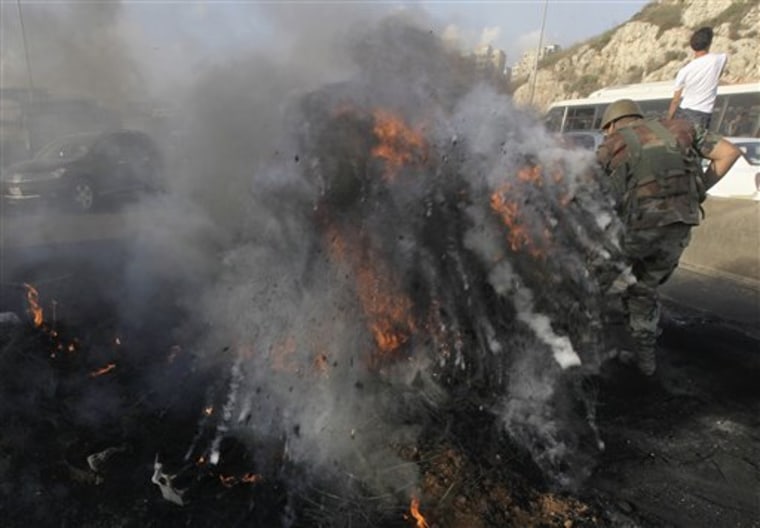Hezbollah and its allies rose to a position of unprecedented dominance in Lebanon's government on Monday, giving patrons Syria and Iran greater sway in the Middle East.
Lebanon's prime minister announced a new Cabinet dominated by the militant group and its allies Monday, after five months without a functioning government. The feat caps Hezbollah's steady rise over decades from resistance force against Israel to Lebanon's most powerful military and political power.
Opponents of Hezbollah — which the U.S. considers a terrorist organization — say having Hezbollah in control of Lebanon's government could lead to international isolation. The group's most ardent supporters are Iran and Syria, which dominated Lebanon for 29 years.
Hezbollah forced the collapse of Lebanon's previous, pro-Western government in January over fears it would be indicted by a U.N.-backed tribunal investigating the 2005 assassination of former Prime Minister Rafik Hariri. Hariri's son, Saad, who was prime minister at the time, refused to denounce the tribunal or cut off Lebanon's 49 percent share of the funding for it.
Hezbollah and its allies then walked out of the government, forcing it to collapse, and secured enough support in parliament to name Najib Mikati as their pick for prime minister. But Mikati has struggled to form a Cabinet, insisting he will not do the bidding of any one side.
On Monday, Mikati announced a Cabinet that gives Hezbollah and its allies 16 of the 30 seats. In the previous government, they had 10 seats.
The Cabinet still must be formally presented for Parliament for a vote of confidence.
Setback for US
The make-up of the new government is seen as almost entirely pro-Syrian. Syrian President Bashar Assad, facing a growing uprising against his rule at home, called twice to congratulate Lebanese leaders on the new government's formation.
The ascendancy of Hezbollah is a setback to the United States, which has provided Lebanon with $720 million in military aid since 2006 and has tried in vain to move the country firmly into a Western sphere and end the influence of Iran and Syria. It also underscores Iran's growing influence in the region at a time when Washington's is falling.
Lebanon's politics are always fractious, in part because of the sectarian makeup of the country's government. According to Lebanon's power-sharing system, the president must be a Maronite Christian, the prime minister a Sunni Muslim and the parliament speaker a Shiite Muslim.
Each faith makes up about a third of Lebanon's population of 4 million.
Talal Arslan, a politician from the tiny Druse sect, resigned Monday after it was announced he was named to the post of state minister without portfolio. He said Mikati should have given the representative of the Druse community a higher-profile post.
Mikati urged the Lebanese to give the government a chance to prove itself.
'Do not judge intentions'
"Do not judge intentions and people, but rather actions," he said during a televised news conference.
Hezbollah denies any links to the killing of Rafik Hariri and calls the court a conspiracy by the U.S. and Israel. The group and its allies walked out of the previous government when then-Prime Minister Saad Hariri — the slain man's son — refused to denounce the tribunal and cut off Lebanon's 49 percent share of the funding for it.
Many fear Hezbollah will react violently if its members are indicted, as is widely expected.
Mikati was quick to reiterate that his government will respect Lebanon's international commitments, a reference to the international tribunal, suggesting that he will not cut its funding.
Saad Hariri, who has described Mikati's nomination as a coup, vowed not to be part of the new government and his Western-backed coalition is now the opposition in Lebanon.
